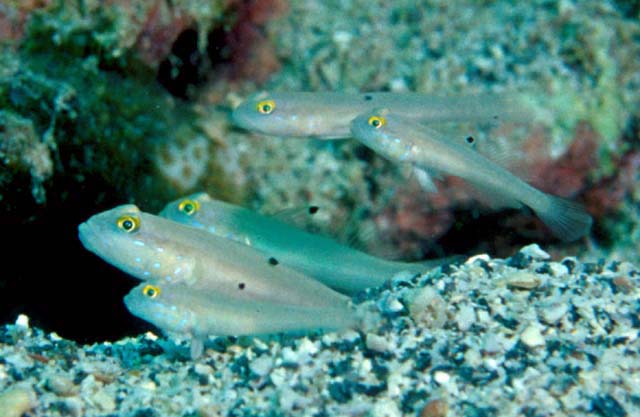| Gobiidae (Gobies), subfamily: Gobiinae |
| 14 cm TL (male/unsexed) |
|
reef-associated; marine; depth range 3 - 25 m, |
| Indo-Pacific: Red Sea, Persian Gulf and East Africa to Samoa; north to Yaeyama Islands, Ryukyu Islands, south to Queensland, Australia. |
|
Dorsal spines (total): 7-7; Dorsal soft rays (total): 12-12; Anal spines: 1-1; Anal soft rays: 11-13. Description: Characterized by pale grey body color with faint pinkish stripe along lower side; cheek with blue to white spots; first dorsal fin with black tip; absence of filamentous dorsal spines; pointed caudal fin, longer in male, 2.9-3.6 in SL; longitudinal scale series 71-99; ctenoid body scales, becoming cycloid anterior to line from upper pectoral fin base to first dorsal fin origin and on abdomen; head or midline of nape without scales; side of nape with scales extending forward short distance anterior to gill opening; partly or fully scaled prepelvic area; depth of body 5.1-6.5 in SL (Ref. 90102). |
| Inhabits silty or sandy areas of lagoons and bays (Ref. 9710, 48637). Usually in pairs and lives in a burrow under rocks. Commonly seen in aggregations over large areas in lagoons of atolls. Monogamous (Ref. 52884). |
|
Least Concern (LC); Date assessed: 20 June 2017 Ref. (130435)
|
| harmless |
Source and more info: www.fishbase.org. For personal, classroom, and other internal use only. Not for publication.

